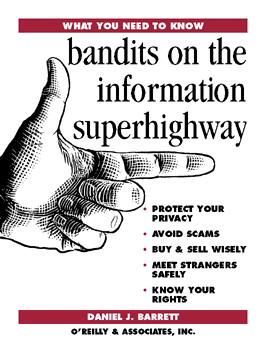
Bandits is not just for new (and not so new) users frightened by the uncertainties of being on-line; it is also for those who are not yet connected, who have put off getting net access through fear of the unknown.
Author: Daniel J. Barrett
Publisher: O'Reilly & Associates
ISBN: 1-56592-156-9
Price: $17.95
Reviewer: Danny Yee

Bandits on the Information Superhighway is the best book yet in O'Reilly's “What You Need to Know” series, and perhaps an even more valuable contribution to making the Internet accessible than their classic The Whole Internet. It is a survey of all the bad things that can happen to you on-line: it explains what the dangers are and what you can do to minimise them. Bandits is not just for new (and not so new) users frightened by the uncertainties of being on-line; it is also for those who are not yet connected, who have put off getting net access through fear of the unknown.
The eleven chapters of Bandits (not counting the introduction) can be read independently of one another. The topics covered are privacy (mostly dealing with e-mail and news rather than computer security in general); get rich pyramid schemes; other common scams (advertisements dressed up as ordinary posts, students trying to get others to write their assignments, etc.); how to avoid paying money for free information; how to buy and sell safely; Usenet spams, April Fools' day jokes, urban legends, and junk e-mail; net relationships (particularly romances); looking after children (including some much needed deflation of media pornography myths); legal issues (what are your rights?); what to do if you are ripped off (where you can turn for help and when there isn't anything you can do); and what the future holds for the Internet.
The format of Bandits, like that of the other “What You Need to Know” books, is designed to be as friendly as possible: it has short personal anecdotes (including some from ordinary users) in the margin, separate boxes dealing with more specialised subjects, and only as much technical material as is absolutely necessary. But Barrett knows his stuff and the contributors include such respected Usenetters as Joel Furr and Brad Templeton: not once did I stop and think “Hey, that's not right” or “That's not the right way of putting that”.
I do think a few improvements could be made to Bandits. It assumes in several places that users are connecting to a Unix server over an Ethernet (lots of concern about packet sniffers, and discussion of “finger” and “talk”) rather than to an ISP using a modem. (Not only are people in the latter class now a majority of Internet users, but they are the ones who most need Bandits, since they are less likely to have a system administrator to turn to for advice or reassurance.) Though lots of URLs are provided as sources for further information, the focus is heavily on e-mail and Usenet and there is little discussion of the Web itself. (It would have been useful to explain, for example, that http://www.univ.edu/admin/ is more likely to be an “official” page than www.univ.edu/~bloggs/me.html.) And finally, there is nothing on purely intellectual banditry. (Serdar Argic, for example, was more than just a spammer: it was his complete reversal of the truth and his creative use of references which really made him dangerous.) Admittedly the ability to distinguish the respectable and objective from propaganda and the lunatic fringe is hardly something one can hope to teach in a chapter, but it would have been nice to see a few guidelines.
Disclaimer: I requested and received a review copy of Bandits on the Information Superhighway from O'Reilly & Associates, but I have no stake, financial or otherwise, in its success.